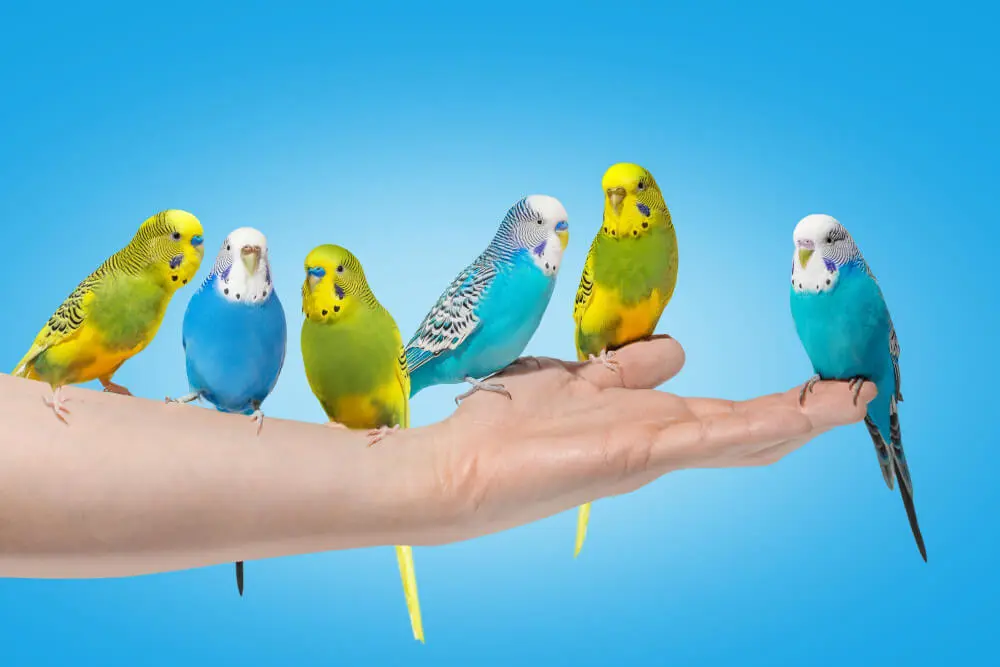Introduction
If you’re a budgerigar owner or considering getting one, you’re probably curious about their lifespan. Understanding the Budgerigar lifespan is crucial for providing the best care and ensuring your feathered friend lives a long, healthy life. On average, budgies, also known as parakeets, can live between 5 to 10 years, but with proper care, some have been known to reach up to 15 years or more.
In this guide, we’ll dive into everything you need to know about the lifespan of a budgie, from the factors that affect their longevity to tips on how to increase your budgerigar’s lifespan. We’ll cover essential aspects like diet, environment, and healthcare, and debunk common myths about budgerigar life expectancy.
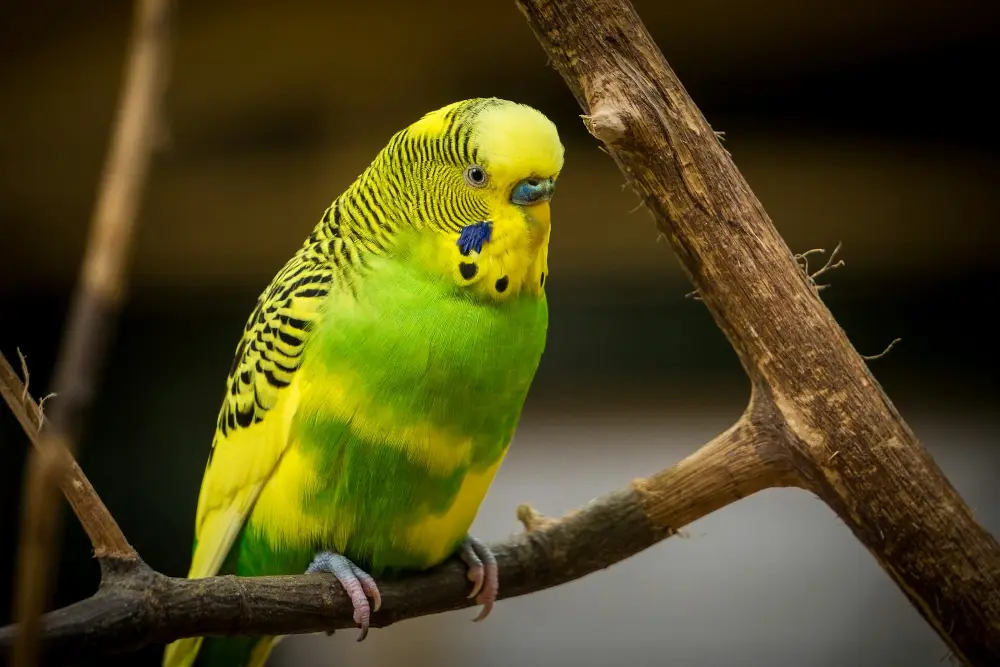
A green and yellow budgerigar perched gracefully on a branch.
Whether you’re a new bird owner or a seasoned parakeet enthusiast, our goal is to provide you with valuable insights and practical advice to help your budgie thrive. Let’s explore the fascinating world of budgerigars and discover how you can ensure your pet lives a long, happy, and healthy life.
What is a Budgerigar?
A budgerigar, often simply called a budgie, is a small, colorful parrot native to Australia. These cheerful birds are known for their bright plumage and playful personalities, making them one of the most popular pet birds worldwide. Budgerigars belong to the parrot family and are sometimes referred to as parakeets, especially in the United States.
Budgies are relatively small, typically measuring around 7 inches in length. Despite their size, they have a big personality, known for their curiosity and intelligence. They come in a variety of colors, with green and yellow being the most common in the wild, though selective breeding has produced many other vibrant colors.
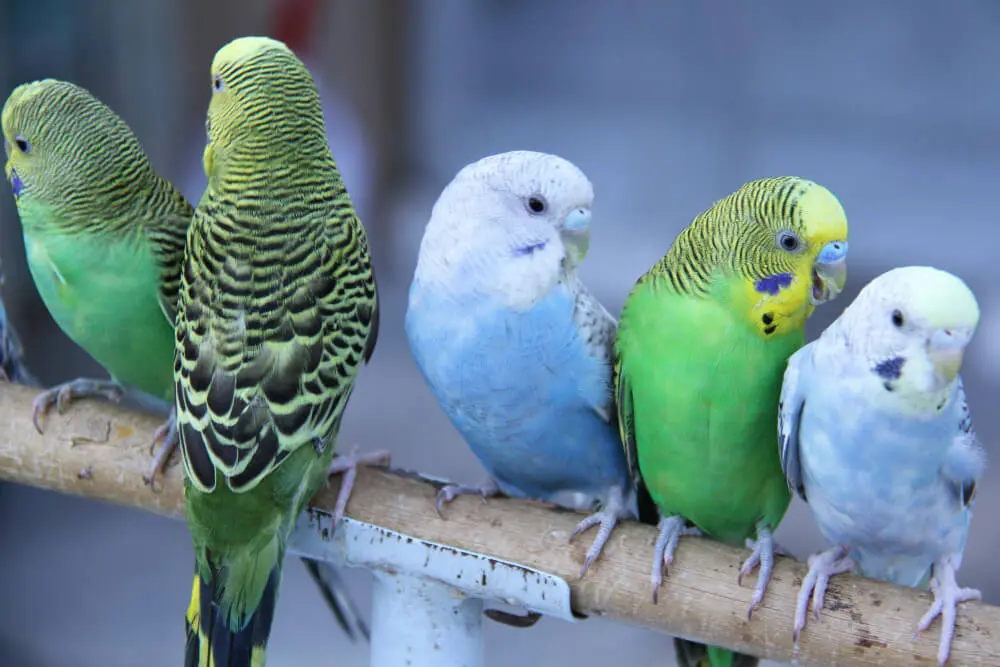
A group of budgerigars perched closely together, showcasing their social nature.
One of the reasons budgies are so popular is their social nature. They love to interact with their owners and can even learn to mimic sounds and words. This engaging behavior makes them delightful companions and a great choice for both novice and experienced bird owners.
Understanding the lifespan of a budgerigar is important for potential owners. These birds can live anywhere from 5 to 10 years on average, but with the right care, some have been known to live longer. Factors such as diet, environment, and regular health care play a crucial role in determining how long your budgie will live.
In summary, a budgerigar is a small, colorful parrot with a lively personality, making it a beloved pet for many. Knowing how to properly care for your budgie will help ensure they live a long and happy life, enriching your home with their playful antics and cheerful chirping.
Average Lifespan of a Budgerigar
The average lifespan of a budgerigar is an important topic for any bird owner. Typically, budgies can live between 5 to 10 years, but with excellent care, some budgerigars have been known to live up to 15 years or more. The lifespan of a budgie largely depends on several factors, including diet, environment, and overall health care.
In the wild, budgerigars face many challenges, such as predators and harsh weather conditions, which can affect their lifespan. However, in captivity, with proper care and attention, these delightful birds can enjoy a much longer life.
Providing a balanced diet rich in nutrients is crucial for extending your budgerigar’s lifespan. Fresh fruits, vegetables, seeds, and specially formulated pellets should be a part of their daily diet. Clean, fresh water should always be available to keep them hydrated and healthy.
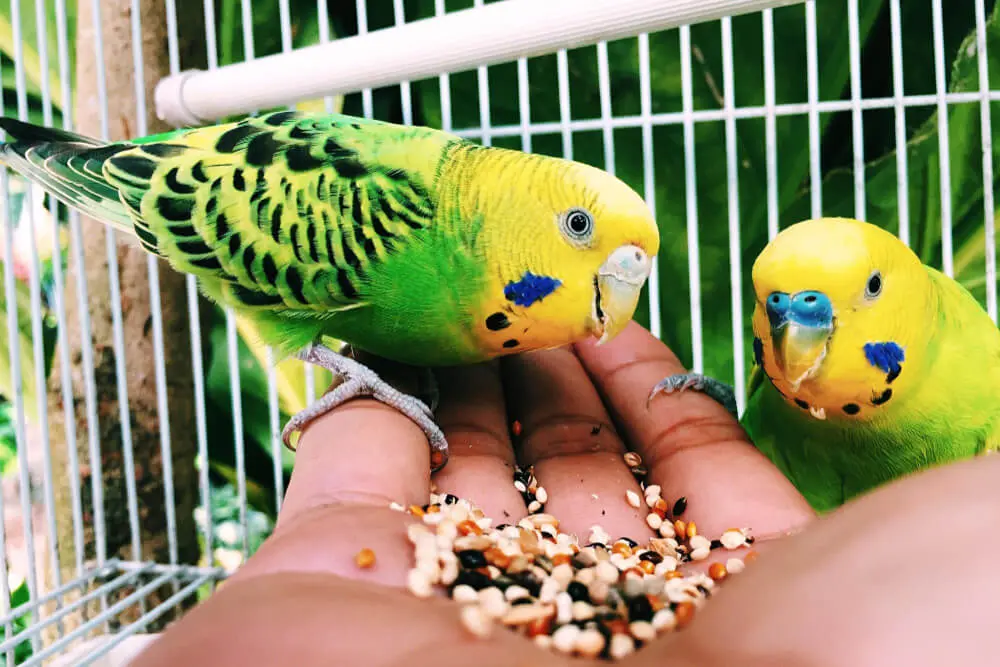
Two budgerigars feeding from a hand, showing the importance of diet in their lifespan.
Creating a safe and stimulating environment is another key factor. A spacious cage with plenty of toys and opportunities for exercise can help keep your budgie physically active and mentally engaged. Regular social interaction, whether with humans or other birds, also contributes to their overall well-being.
Regular veterinary check-ups are essential for catching potential health issues early. Just like any other pet, budgies can suffer from various health problems, but early detection and treatment can make a significant difference in their quality of life and longevity.
In summary, while the average lifespan of a budgerigar ranges from 5 to 10 years, providing the right care can help your budgie live a long, happy life. By focusing on diet, environment, and health care, you can ensure your feathered friend remains a joyful companion for many years.
Factors Affecting and How to Increase Your Budgerigar’s Lifespan
Understanding the factors affecting Budgerigar lifespan and knowing how to enhance it can help you provide the best care for your pet. Several key aspects play a crucial role in determining how long a budgie will live. Here’s a detailed look at these factors and practical tips to help you increase your budgerigar’s lifespan:
Diet and Nutrition
One of the most significant factors influencing a budgerigar’s lifespan is their diet. A balanced diet rich in nutrients is essential for maintaining their health. Fresh fruits and vegetables, high-quality seeds, and specially formulated pellets should form the core of their diet. Avoid feeding your budgie unhealthy foods like chocolate, avocado, and sugary treats, as these can be toxic or harmful.
Environment and Housing
The environment in which your budgerigar lives is another critical factor. Providing a spacious, clean cage with plenty of perches and toys ensures that your budgie has enough space to move around and stay active. Make sure their living area is safe, free from drafts, and not exposed to extreme temperatures. A well-maintained environment reduces stress and promotes overall well-being.
Exercise and Mental Stimulation
Budgies are naturally active and curious birds that require regular exercise and mental stimulation to stay healthy. Providing toys, puzzles, and opportunities for free flight within a safe space can keep them physically fit and mentally sharp. Social interaction with their human caregivers or other budgies is also vital for their happiness and longevity.
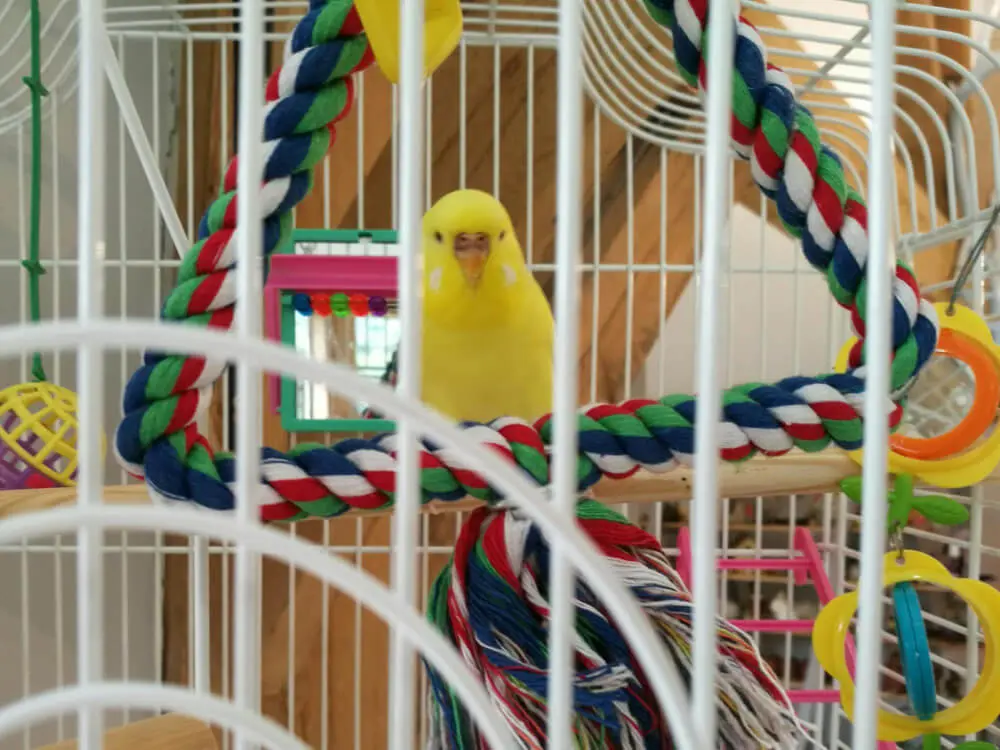
A vibrant yellow budgerigar enjoying its colorful, toy-filled cage.
Health Care and Veterinary Visits
Regular health check-ups with an avian veterinarian are essential for detecting and addressing potential health issues early on. Vaccinations, parasite control, and prompt treatment of illnesses can significantly impact your budgerigar’s lifespan. Familiarize yourself with common health issues in budgerigars and keep an eye out for any signs of illness or distress.
Genetics
Genetics also play a role in determining the lifespan of a budgerigar. Some budgies may be genetically predisposed to certain health conditions, which can affect their longevity. While you can’t change their genetic makeup, providing excellent care can help mitigate some of these risks.
Stress Levels
Minimizing stress is crucial for a long, healthy life. Factors such as loud noises, sudden changes in their environment, and lack of social interaction can cause stress in budgerigars. Creating a stable, calm environment helps reduce stress and supports a healthy life.
Social Interaction
Budgerigars are social creatures that thrive on interaction. Spend quality time with your budgie daily, talking to them and engaging in play. If possible, consider getting a companion budgie to provide constant social interaction. A happy, socially fulfilled budgie is more likely to live a longer, healthier life.
By focusing on these areas and providing attentive, loving care, you can help ensure your budgerigar lives a long, healthy, and happy life. Understanding what influences their lifespan allows you to make informed decisions and give your feathered friend the best possible care.
Common Health Issues in Budgerigars
Knowing about the common health issues in budgerigars is essential for any bird owner. Being aware of these problems can help you identify symptoms early and seek prompt veterinary care, ultimately contributing to a longer, healthier Budgerigar lifespan. Here are some of the most common health concerns:
Respiratory Infections
Respiratory infections are a frequent issue in budgerigars. Symptoms include sneezing, coughing, nasal discharge, and difficulty breathing. These infections can be caused by bacteria, viruses, or fungi. Maintaining a clean cage and providing a draft-free environment can help prevent respiratory problems.
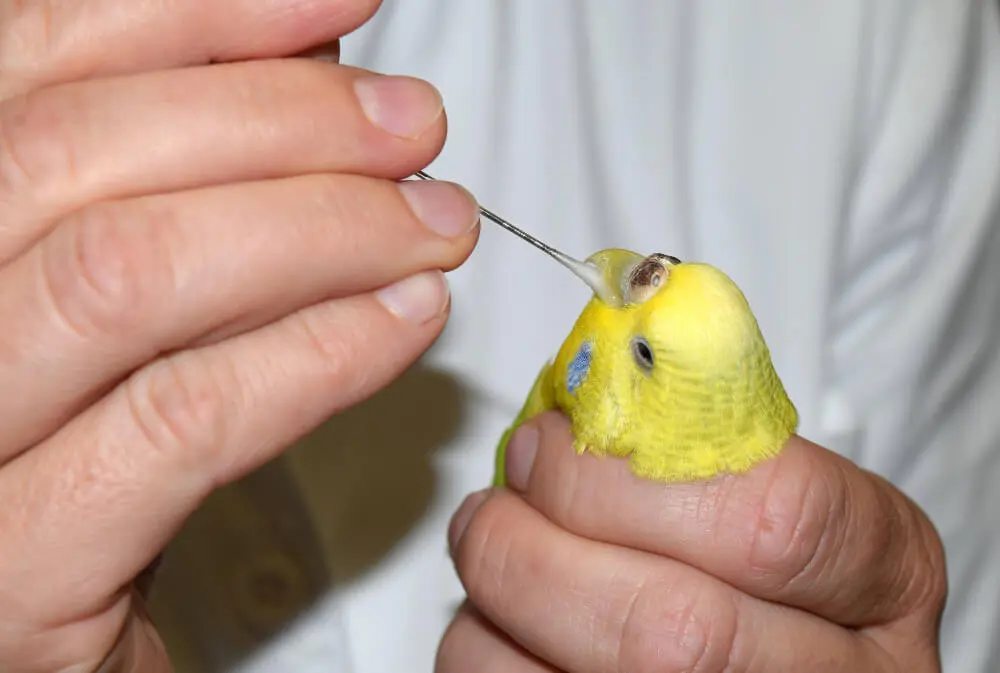
A budgerigar receiving a health checkup, highlighting the importance of regular veterinary visits.
Feather Plucking
Feather plucking is often a sign of stress, boredom, or underlying health issues. If you notice your budgie pulling out its feathers, it’s important to identify the cause. Providing mental stimulation, toys, and social interaction can reduce stress and prevent this behavior.
Psittacosis
Psittacosis, also known as parrot fever, is a bacterial infection that can affect budgerigars. Symptoms include lethargy, weight loss, diarrhea, and respiratory issues. This disease can be transmitted to humans, so prompt veterinary treatment is essential if you suspect your budgie has psittacosis.
Tumors
Budgerigars are prone to developing tumors, particularly fatty tumors (lipomas). These growths can appear anywhere on the body and may cause discomfort or mobility issues. Regular health check-ups can help detect tumors early and determine the best course of action.
Mites and Parasites
External parasites like mites can cause itching, feather loss, and skin irritation in budgerigars. Red mites, in particular, are a common problem. Regular cleaning of the cage and providing parasite control treatments can help keep your budgie free from these pests.
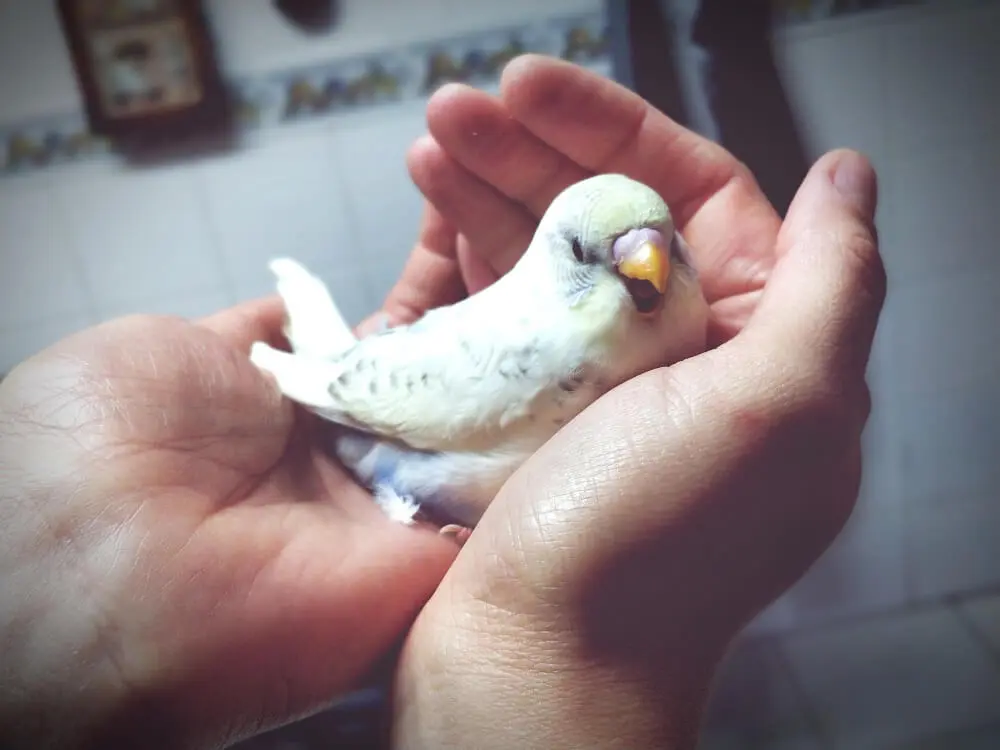
A gentle hold of a budgerigar, emphasizing the bond between pet and owner.
Egg Binding
Egg binding occurs when a female budgie is unable to pass an egg. This condition can be life-threatening and requires immediate veterinary intervention. Symptoms include straining, lethargy, and swelling around the vent area. Ensuring your female budgie has a proper diet with adequate calcium can help prevent egg binding.
Beak and Feather Disease
Beak and Feather Disease (PBFD) is a viral infection that affects the beak, feathers, and immune system of budgerigars. Symptoms include feather loss, beak deformities, and secondary infections. PBFD is highly contagious and currently has no cure, so prevention through good hygiene and quarantine of new birds is crucial.
Gastrointestinal Issues
Budgerigars can suffer from gastrointestinal problems like diarrhea and vomiting, often due to infections, poor diet, or parasites. Providing a balanced diet and maintaining a clean living environment can help prevent these issues.
By being vigilant and proactive about your budgie’s health, you can catch potential problems early and seek appropriate treatment. Regular veterinary check-ups and maintaining a healthy lifestyle for your budgerigar will contribute to a longer, happier life for your feathered friend.
Signs of Aging in Budgerigars
As your budgerigar ages, you may notice certain changes that indicate they are entering their senior years. Recognizing the signs of aging in budgerigars can help you provide the extra care they need to remain healthy and comfortable. Here are some common signs to look out for:
Reduced Activity Levels
One of the most noticeable signs of aging in budgerigars is a decrease in activity. Older budgies may become less playful and energetic, spending more time resting. While it’s normal for activity levels to decline with age, it’s still important to encourage gentle exercise to keep them physically fit.
Changes in Feather Condition
As budgerigars age, their feathers may lose some of their vibrancy and shine. You might notice more frequent molting, and new feathers may not grow back as quickly or as beautifully as before. Regular grooming and a balanced diet can help maintain feather health.
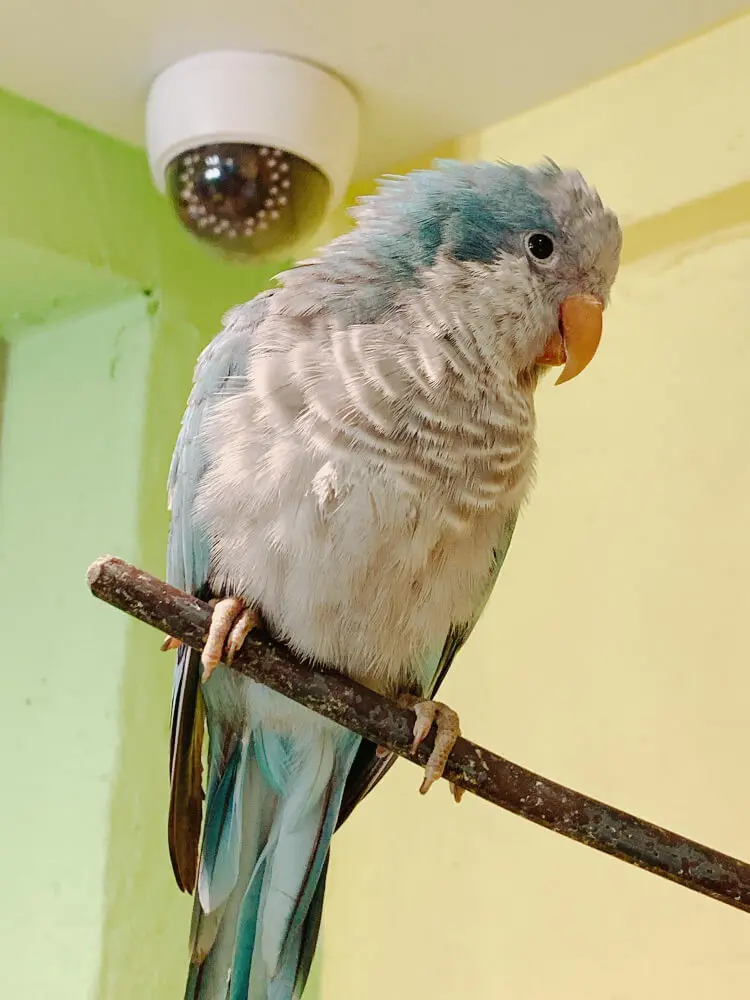
A budgerigar displaying ruffled feathers and a lethargic posture, common signs of health issues in these birds.
Weight Fluctuations
Aging budgerigars may experience weight changes, either losing or gaining weight. Monitoring your budgie’s weight regularly can help you detect any significant changes that might indicate health issues. Adjusting their diet to meet their changing nutritional needs is crucial for maintaining a healthy weight.
Decreased Vision and Hearing
Just like humans, budgerigars can experience a decline in vision and hearing as they age. You might notice them being less responsive to visual and auditory cues. Providing a safe and familiar environment can help them navigate their surroundings more easily.
Increased Sleep
Older budgerigars tend to sleep more than their younger counterparts. It’s normal for them to take more naps throughout the day. Ensure they have a quiet, comfortable place to rest without disturbances.
Joint Stiffness and Mobility Issues
Arthritis and joint stiffness are common in aging budgerigars. You may notice your budgie having difficulty perching, climbing, or moving around. Providing soft perches and easy-to-navigate spaces can help them stay comfortable and active.
Changes in Appetite
An aging budgerigar may show changes in appetite, either eating less or becoming pickier about their food. Ensuring they receive a nutrient-rich diet and offering a variety of healthy foods can help maintain their interest in eating.
Behavioral Changes
Older budgies might exhibit changes in behavior, such as being less social or vocal. They may prefer quieter, more relaxed interactions. Being patient and gentle with your aging budgie will help them feel secure and loved.
By being attentive to these signs of aging in budgerigars, you can make the necessary adjustments to their care routine to support their health and well-being. Regular veterinary check-ups are important to address any age-related health issues promptly. With the right care, your senior budgie can continue to enjoy a comfortable and happy life.
Frequently Asked Questions (FAQs) About Budgerigar lifespan
How long do budgerigars live on average?
The average lifespan of a budgerigar is typically between 5 to 10 years. However, with proper care, some budgies can live up to 15 years or more.
What factors affect the lifespan of a budgerigar?
Several factors influence the lifespan of a budgie, including diet, environment, exercise, health care, genetics, and stress levels. Providing a balanced diet, a safe and stimulating environment, regular veterinary check-ups, and minimizing stress can all contribute to a longer, healthier life.
How can I increase my budgerigar’s lifespan?
To increase your budgerigar’s lifespan, focus on providing a nutritious diet, plenty of physical and mental stimulation, a clean and safe living environment, regular health check-ups, and lots of social interaction. These elements are key to ensuring your budgie remains healthy and happy.
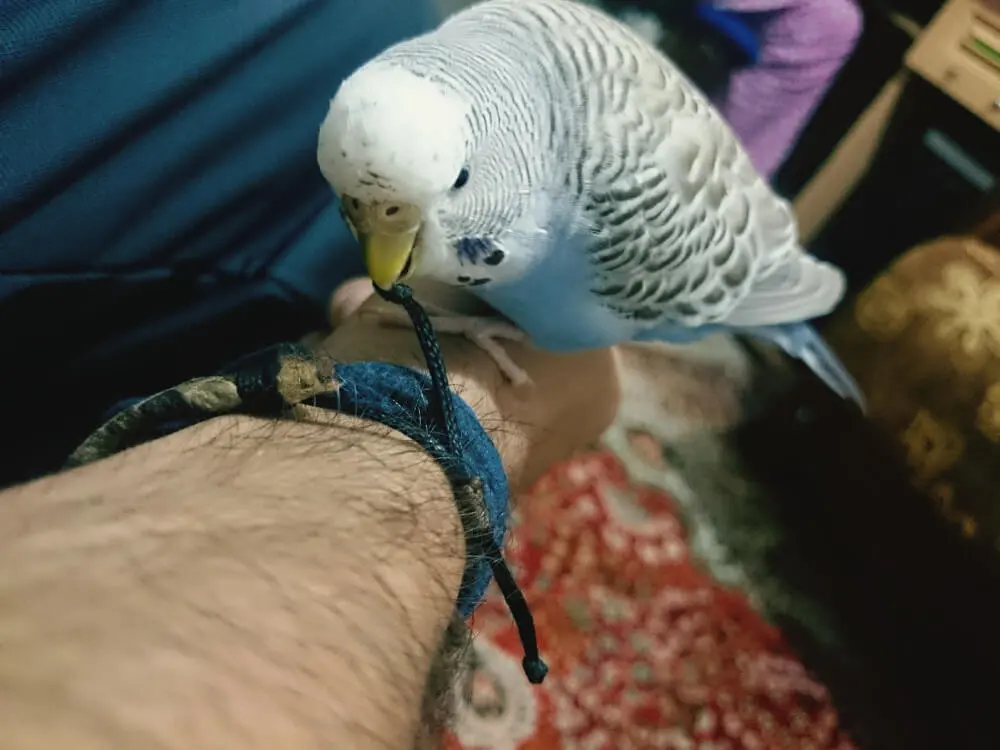
A budgerigar engaging with its owner, highlighting the social nature of these birds.
What are common health issues in budgerigars?
Common health issues in budgerigars include respiratory infections, feather plucking, psittacosis, tumors, mites and parasites, egg binding, beak and feather disease (PBFD), and gastrointestinal problems. Regular veterinary visits and attentive care can help manage and prevent these issues.
How do I know if my budgerigar is aging?
Signs of aging in budgerigars include reduced activity levels, changes in feather condition, weight fluctuations, decreased vision and hearing, increased sleep, joint stiffness, changes in appetite, and behavioral changes. Recognizing these signs can help you provide the extra care your senior budgie needs.
What should I feed my budgerigar to ensure a long lifespan?
A balanced diet is crucial for your budgie’s health. Provide fresh fruits and vegetables, high-quality seeds, and specially formulated pellets. Avoid feeding your budgie toxic foods like chocolate, avocado, and sugary treats. Fresh water should always be available.
How often should I take my budgerigar to the vet?
Regular health check-ups with an avian veterinarian are essential. Ideally, you should take your budgerigar to the vet at least once a year for a routine check-up, and immediately if you notice any signs of illness or distress.
Can budgerigars live longer in captivity than in the wild?
Yes, budgerigars generally live longer in captivity than in the wild. In the wild, they face numerous threats such as predators and harsh environmental conditions. In a well-cared-for captive environment, with proper diet, healthcare, and minimal stress, they can live significantly longer.
By addressing these frequently asked questions, you can better understand how to care for your budgie and ensure they lead a long, healthy life. Your dedication to learning about Budgerigar lifespan is vital in providing the best possible care for your feathered friend.
Conclusion
Understanding the Budgerigar lifespan and the factors that influence it is crucial for ensuring your feathered friend lives a long, healthy, and happy life. By providing a balanced diet, a safe and stimulating environment, regular health check-ups, and plenty of social interaction, you can significantly increase your budgie’s lifespan.
Recognizing the signs of aging in budgerigars and being aware of common health issues can help you address any concerns promptly, ensuring your pet receives the best care possible. Remember, every budgerigar is unique, and their needs may change as they age. Staying attentive and responsive to these changes will help your budgie thrive.
Whether you’re a new budgie owner or have years of experience, the love and care you provide play a vital role in your pet’s well-being. By following the tips and advice outlined in this guide, you can help your budgerigar enjoy a fulfilling and extended life, enriching your home with their cheerful presence and playful antics.
Thank you for taking the time to learn about Budgerigar lifespan. Your commitment to understanding and improving your budgie’s life is a testament to your dedication as a responsible pet owner. Here’s to many happy and healthy years with your beloved budgerigar!

